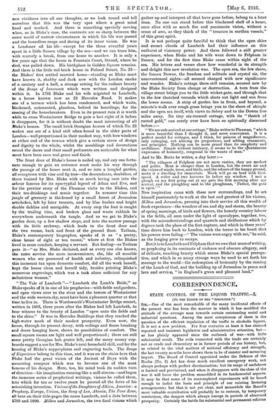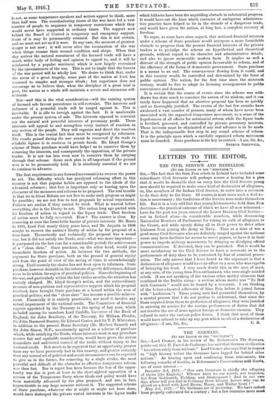CORRESPONDENCE.
STATE CONTROL OF THE LIQUOR TRAFFIC.—L
ITO THE EDITOR OF TEE " SPECTATOR...1 Six,—One of the most remarkable of the many incidental effects of the present war has been the manner in which it has modified the attitude of the average man towards certain outstanding social and industrial questions. Among the most conspicuous of these is the question of the efficient regulation of the traffic in alcoholic liquors. It is not a new problem. For four centuries at least it has claimed repeated and insistent legislative and administrative attention, bet- as has plainly appeared since the outbreak of war—with little substantial result. The evils connected with the trade are certainly, not as crude and elementary as in former periods of our history, but, as related to the vital matters of national efficiency and strength, the last twenty months have shown them to be of sinister and menacing import. The Board of Control appointed under the Defence of the Realm (No. 3) Act has done much excellent emergency work, not always perhaps with perfect discrimination; but its range of usefulness is limited and provisional, and when it disappears with the close of the war it will leave the problem unmodified in its fundamental aspects: It may be that some of its contemplated experiments will be broad enough to indict the basis and principle of our existing licensing arrangements; but that is not yet clear, and meanwhile the Board's most valuable contribution will probably be to restrain, by temporary restrictions, the dangers which always emerge in periods of abnormal prosperity. Certainly the battle for substantial and permanent reforms :is not, as some temperance speakers and writers appear to think, more than half won. The overshadowing issues of the war have led a vast 'number of people to acquiesce in temporary restrictions which they would never have supported in ordinary times. The support now behind the Board 02 Control is temporary and emergency support. Some of it may be permanently retained. But this is not certain, and we must not act-as if it were. In any ease, the moment of greatest danger is not now ; it will occur after the termination of the war when things resume their normal condition and shape. When that day arrives the natural resentment of the licensed trade will have a much_ wider body of feeling and opinion to appeal to, and it will be reinforced by a popular sentiment which is now largely restrained by the circumstances of the war. This is not to imply that the lessons ef the vise period will be wholly lost. We desire to think that, under the stress of a great tragedy, some part of the nation at least has returned to simpler and stronger ideals ; but experience does not encourage us to believe that, when the discipline of a great trial is past, the nation as a whole will maintain a severe and strenuous self- restraiet.
Nor—and this is the vital consideration—will the existing system of licensed sale favour persistence in. self-restraint. The interests and influence of a powerful trade will be ranged against it. This is inevitable. It is idle to inveigh against the fact. It is unalterable under the present system of sale. The interests opposed to restraint are the natural and powerful interests of pecuniary profit. These interests will appeal to and strengthen every instinct of reaction in any section of the people. They will organize and direct the reaction itself. This is the crucial fact that must be recognized by reformers. The results gained during the war cannot be conserved if the trade in cecoholic liquors is to continue in private hands. Mr. Lloyd George's scheme of State purchase would have helps 1 us to conserve them by removing the interests, and consequently the opposition, of the private trader. It is not too late even now to conserve them by carrying through that scheme. Some such plan is all-important if the ground won is to be permanently held. It is absolutely essential if we are
, to continue to advance. - The first requirement in any forward movement is to recover the power to act. The difficulty which has paralysed reforming effort in this country is not that popular habits are opposed to the ideals of the advanced reformer ; that fact is important only as bearing upon the character of the measures and reforms to be proposed. The real trouble is that we in Great Britain are not free to make such progress as might be possible ; we are not free to test proposals by actual experiment. Policies are useless if they cannot be tried. What is wanted before everything else is the liberty to act. The nation long ago parted with its freedom of action in regard to the liquor trade. That freedom of action must be fully recovered. How ? The answer is clear. By removing at once the formidable barrier of private interests. Mr. Bruce in 1871, Lord Peel nearly thirty years later, and Mr. Asquith in 1908 sought to recover the nation's liberty of action by the proposal of a time-limit. Theoretically and technically the proposal was a sound one, but it did not satisfy the Trade, and—what was more important— it postponed (in the last case for a considerable period) the achievement of a " clean slate." State purchase, on the other hand, would give immediate freedom of action. As between the two methods, the argument for State purchase, both on the ground of general equity and from the point of view of the saving of time, is overwhelmingly strong. Until recently the choice) has not been open to reformers. State purchase, however desirable in the interests of speedy deliverance, did not seem to lie within the region of practical polities. Since the beginning of the war, and particularly within the last twelve months, the situation has entirely changed. Mr. Lloyd George's action, and the extraordinary measure of non-partisan and representative support which his proposal received, have brought State purchase at a bound within the area of practical politics, and the " clean slate " has become a possible achieve- ment. Financially it is entirely practicable, nor need it involve any actual impairment of the national credit. The Committee of financial experts appointed by the Treasury in the spring of last year, which included among its members Lord Cunliffe, Governor of the Bank of England, Sir John Bradbury, of the Treasury, Sir William Plender, Sir John Harwood-Banner, Sir Edward Coates, and Sir T. P. Whittaker, in addition to the present Home Secretary (Mr. Herbert Samuel) and Sir John Simon, M.P., unanimously agreed on a scheme of purchase which, while satisfying the Trade, whose interests must in any procedure receive fair and equitable consideration, would have given the nation imniediato and unfettered control of the traffic without injury to the national credit. It is much to be regretted that as opportunity greater than any we have previously had in this country, and greater certainly than any normal set of political and social circumstances can be expected to give us in the future, for removing, by a single stroke, the most powerful and difficult of the obstacles to effective temperance reform, was then lost. Nor is regret less keen because the loss of the oppor- tunity was due in part at least to the short-sighted opposition of a section of the Temperance Party whose ideals and policy would have been materially advanced by the plan proposed, and are, in fact, impracticable in any large measure without it. The suggested scheme of State purchase, whatever else it might or might not have done, would have destroyed the private vested interests in the liquor traffic)
which hitherto have been the unyielding obstacle to substantial progress. It would have out the knot which centuries of ambiguous administra- tive practice have helped to tie in the strands of a dangerous trade, and would have given the nation, at long last, a complete recovery of freedom.
To argue, as some have since argued, that national financial interests under a scheme of State purchase would interpose a more formidable obstacle to progress than the present financial interests of the private traders is to prejudge the scheme on hypothetical and theoretical grounds, without regard to its character and administrative detaili, and also to ignore memorable modern facts. It implies as well a distrust of the strength of public opinion favourable to reform, and ef the efficiency of the forms of democratic government. State purchase is a means to an end. The consequences flowing from it could, and in this country would, be controlled and determined by the force ef public opinion. The nation, for the first time since the sixteenth century, would be free to adapt its licensing arrangements to public convenience and demand.
It is certain that the course of events since the scheme was with- drawn has done much to convince the nation of its wisdom, and it can rarely have happened thet an abortive proposal has been so quickly and so thoroughly justified. The events of the last few months have awakened a vast number of persons, many of whom have never been associated with the organized temperance movement, to a sense of the hopelessness of all efforts for substantial reform while the liquor trade is fortified, governed, and controlled by private pecuniary interests. These interests must be eliminated if any real advance is to be made. That is the indispensable first step in any sound scheme of reform. It is the principle upon which a carefully organized reform movement must be founded. State purchase is the key to control.—I am; Sir, Scc.,
ARTHUR SLIERWELL.































 Previous page
Previous page